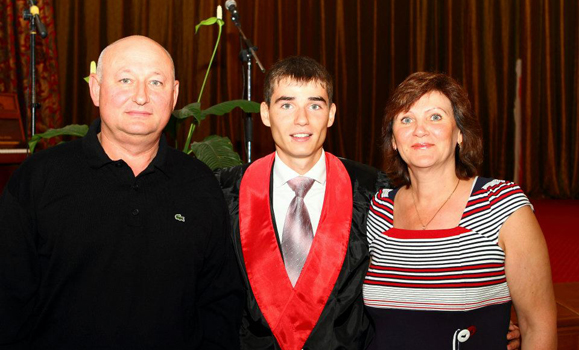When Russia invaded Ukraine in late February 2022, Halifax lawyer and¬ÝSchulich Law¬Ýgrad Igor Yushchenko (LLM‚Äô12)¬Ýwatched in horror as events played out on TV news.
“You don’t expect this to happen, and then this situation is affecting your relatives, your home,” says Yushchenko, pictrured right.
He managed to bring his parents to Canada, but much of his extended family, including his grandfather who is too old to make the journey, are still in Ukraine.
“We have no idea who is winning or who’s losing,” he says. “We are fighting against one of the most powerful enemies in the world.”
Influencing policy to save lives
In the fraught weeks since the invasion, Yushchenko and fellow Halifax-based Ukrainian lawyer Jason Woycheshyn have worked with the Canadian government to create a program to expedite Ukrainian immigration. It was important that Ukrainians be able to come not as refugees — a slow process that requires applying once you are outside of your home county — but instead be allowed to apply through a new “accelerated temporary residence pathway” that allows them to stay in Canada for up to three years.
This special immigration stream recognizes that Ukrainians may not be able to access the documents usually required for immigrating.
“To come to Canada, you need to provide fingerprints. Right now, to get an appointment to do that in Ukraine takes two to three months,” Yushchenko explains. “My dad was asked to provide a letter from the military and a police check, but it is wartime. These documents are impossible to obtain. Now upon request, the Canadian government can waive this requirement.”
Yushchenko, Woycheshyn and other lawyers who have since joined them to help are spending much of their time fielding calls from and helping Ukrainians get their paperwork in order to fulfil these new requirements.

Igor Yushchenko with his parents, who are now in Canada.
Beyond legal help
Every day, Yushchenko helps Ukrainians (three or four different people a day, he estimates) apply through the expedited program. It is just one part of the work he is doing. He is also helping these displaced people find employment and accommodations when they arrive.
As awareness rises, more people have offered help with this, and many of them are from H¬˛ª≠‚Äôs legal community.
‚ÄúOne retired lawyer in Chester, for example, reached out and told me that if there were Ukrainians in need coming to Nova Scotia, he had somewhere that they could live,‚Äù Yushchenko says. ‚ÄúSo many others have reached out to offer shelter and other supports. It has reminded me of the sense of community I felt when studying at H¬˛ª≠.‚Äù
There was a time after graduating when Yushchenko was unsure that he would find his place in Canada. He wanted to stay here and gather Canadian experience, but spent months sending out resumes to law firms looking to article with them to no avail. “Several Canadians told me that as an immigrant, I would never become a lawyer in Canada,” Yushchenko explains. This was shocking, as he had never been made to feel any different throughout his studies here. “I sent letters to half the law firms in Canada, even in the Yukon, but received no reply,” he says.
Mentorship and support
When leaving an appointment with an employment counsellor at the Immigrant Services Association of Nova Scotia (ISANS), he approached a man whom he assumed to be a lawyer (‚Äúhe was wearing a suit‚Äù) and took a chance. The man was fellow Dal alum¬ÝWayne Bacchus (LLD‚Äô99)¬Ýand Yushchenko handed him a resume.
‚ÄúHe [Bacchus] said, you graduated from H¬˛ª≠? Let me review your CV and I‚Äôll give you a call,‚Äù Yushchenko explains. Bacchus offered Yushchenko a job and became his mentor. Yushchenko stayed at Bacchus Law for almost seven years, first as a researcher, then articling, then as a lawyer and barrister. In 2019, Yushchenko started his law firm in Halifax,¬Ý.
Most of Yushchenko’s time is dedicated to helping Ukrainians. He says that he can cope with the financial impact this will have on his law firm. “It wasn’t as though I could be 100 per cent productive seeing that the cities my family lives in are under attack,” he says, “The Ukrainian people are showing such strength, I had to do this.”

